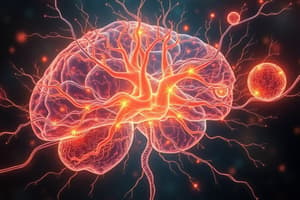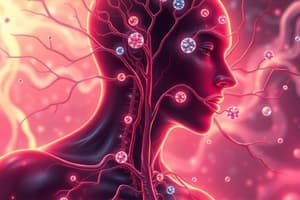Podcast
Questions and Answers
What is the primary function of the autonomic nervous system?
What is the primary function of the autonomic nervous system?
- Regulates conscious thought processes
- Controls voluntary movements
- Enhances muscular strength
- Mediates involuntary functions (correct)
Which neurotransmitter is primarily associated with the parasympathetic nervous system?
Which neurotransmitter is primarily associated with the parasympathetic nervous system?
- Acetylcholine (correct)
- Norepinephrine
- Serotonin
- Dopamine
Which of the following is a characteristic of the sympathetic nervous system?
Which of the following is a characteristic of the sympathetic nervous system?
- Decreases heart rate
- Enhances digestion
- Stimulates the fight or flight response (correct)
- Promotes calming of nerves
Which type of drug acts by mimicking the parasympathetic nervous system?
Which type of drug acts by mimicking the parasympathetic nervous system?
What is the effect of anticholinesterase drugs like physostigmine?
What is the effect of anticholinesterase drugs like physostigmine?
Which drug is classified as a sympatholytic?
Which drug is classified as a sympatholytic?
What effect do parasympatholytics like atropine have on the body?
What effect do parasympatholytics like atropine have on the body?
Which of the following medications would be categorized as a sympathomimetic?
Which of the following medications would be categorized as a sympathomimetic?
What is the primary pharmacological action of pilocarpine on the eyes?
What is the primary pharmacological action of pilocarpine on the eyes?
What is a therapeutic use of pilocarpine?
What is a therapeutic use of pilocarpine?
Which of the following is a major side effect of pilocarpine?
Which of the following is a major side effect of pilocarpine?
What type of receptor does pilocarpine primarily act as an agonist for?
What type of receptor does pilocarpine primarily act as an agonist for?
Which of the following ganglionic blockers is classified as a competitive blocker?
Which of the following ganglionic blockers is classified as a competitive blocker?
Which pharmacological action of pilocarpine affects the cardiovascular system?
Which pharmacological action of pilocarpine affects the cardiovascular system?
What mechanism does depolarizing blockers use in relation to nicotinic receptors?
What mechanism does depolarizing blockers use in relation to nicotinic receptors?
What is a common consequence of pilocarpine use if overdosed?
What is a common consequence of pilocarpine use if overdosed?
What is the first step in the scheme for identification of drugs acting on the ANS?
What is the first step in the scheme for identification of drugs acting on the ANS?
Which observation indicates a decrease in motor activity after administration?
Which observation indicates a decrease in motor activity after administration?
What effect on narcosis was observed before and after administration?
What effect on narcosis was observed before and after administration?
What response was noted regarding escape behavior after touch?
What response was noted regarding escape behavior after touch?
Which reflex showed normal response before and after administration?
Which reflex showed normal response before and after administration?
What was the effect on tremors after drug administration?
What was the effect on tremors after drug administration?
Which factor is NOT part of the drug identification scheme?
Which factor is NOT part of the drug identification scheme?
What is the effect of miosis on pupil diameter?
What is the effect of miosis on pupil diameter?
What was the effect on behavior observed after drug administration?
What was the effect on behavior observed after drug administration?
Which of the following is an effect of a Parasympathomimetic drug like Pilocarpine?
Which of the following is an effect of a Parasympathomimetic drug like Pilocarpine?
What is a characteristic respiratory response to Nicotine?
What is a characteristic respiratory response to Nicotine?
What change is observed in heart rate as a result of miosis?
What change is observed in heart rate as a result of miosis?
Which of these changes is NOT associated with the administration of Pilocarpine?
Which of these changes is NOT associated with the administration of Pilocarpine?
What initial cardiovascular effect is noted after administering Nicotine?
What initial cardiovascular effect is noted after administering Nicotine?
Which detailed change occurs in the eye following Nicotine exposure?
Which detailed change occurs in the eye following Nicotine exposure?
Which of the following is a potential cause of death associated with Nicotine?
Which of the following is a potential cause of death associated with Nicotine?
Flashcards
Sympathetic nervous system
Sympathetic nervous system
Part of the autonomic nervous system involved in the 'fight or flight' response; responsible for arousal and energy generation.
Parasympathetic nervous system
Parasympathetic nervous system
Part of the autonomic nervous system involved in 'rest and digest'; responsible for calming nerves and normal functioning.
Parasympathomimetics
Parasympathomimetics
Drugs that mimic the parasympathetic nervous system; also called cholinergics.
Parasympatholytics
Parasympatholytics
Signup and view all the flashcards
Sympathomimetics
Sympathomimetics
Signup and view all the flashcards
Sympatholytics
Sympatholytics
Signup and view all the flashcards
Autonomic Nervous System (ANS)
Autonomic Nervous System (ANS)
Signup and view all the flashcards
Cholinergics
Cholinergics
Signup and view all the flashcards
Species
Species
Signup and view all the flashcards
Sex
Sex
Signup and view all the flashcards
Route of administration
Route of administration
Signup and view all the flashcards
Weight
Weight
Signup and view all the flashcards
Dose calculation
Dose calculation
Signup and view all the flashcards
Observation: Grip strength
Observation: Grip strength
Signup and view all the flashcards
Observation: Locomotion
Observation: Locomotion
Signup and view all the flashcards
Observation: Spontaneous motor activity
Observation: Spontaneous motor activity
Signup and view all the flashcards
What does Miosis mean?
What does Miosis mean?
Signup and view all the flashcards
What's the effect of the Drug on Salivation?
What's the effect of the Drug on Salivation?
Signup and view all the flashcards
What is the effect of the drug on Heart Rate?
What is the effect of the drug on Heart Rate?
Signup and view all the flashcards
What is the drug's effect on Respiration?
What is the drug's effect on Respiration?
Signup and view all the flashcards
What is the drug's effect on Excretions?
What is the drug's effect on Excretions?
Signup and view all the flashcards
What is the Drug's Peculiarity?
What is the Drug's Peculiarity?
Signup and view all the flashcards
Nicotine's Effect on Heart Rate?
Nicotine's Effect on Heart Rate?
Signup and view all the flashcards
What is the Cause of Death in Nicotine Poisoning?
What is the Cause of Death in Nicotine Poisoning?
Signup and view all the flashcards
Ganglionic stimulants
Ganglionic stimulants
Signup and view all the flashcards
Ganglionic blockers (Depolarizing)
Ganglionic blockers (Depolarizing)
Signup and view all the flashcards
Ganglionic blockers (Competitive)
Ganglionic blockers (Competitive)
Signup and view all the flashcards
Pilocarpine
Pilocarpine
Signup and view all the flashcards
Pilocarpine's effects on the eyes
Pilocarpine's effects on the eyes
Signup and view all the flashcards
Therapeutic use : Glaucoma
Therapeutic use : Glaucoma
Signup and view all the flashcards
Pilocarpine's therapeutic use in xerostomia
Pilocarpine's therapeutic use in xerostomia
Signup and view all the flashcards
Pilocarpine's role in sweat testing
Pilocarpine's role in sweat testing
Signup and view all the flashcards
Study Notes
Pharmacology I (PPT301) - Fall 2024-2025
- Course: Pharmacology I (PPT301)
- University: New Mansoura University
- Faculty: Faculty of Pharmacy
- Pharm D Program
- Intended Learning Outcomes:
- Distinguish between sympathetic and parasympathetic nervous systems and their effects on the body.
- Identify autonomic acting drugs and their effects.
- Schematically identify unknown autonomic acting drugs.
Autonomic Nervous System (ANS)
- The ANS is part of the peripheral nervous system.
- It controls visceral functions largely below the level of consciousness.
- Most ANS actions are involuntary.
- Controls: Heart rate, salivation, digestion, respiratory rate, perspiration, pupil diameter, urination, and defecation.
Sympathetic Nervous System
- Fight or flight response
- Arousal and energy generation
- Inhibits digestion
Parasympathetic Nervous System
- Rest and digest
- Calming of nerves and normal function
- Enhances digestion
Drugs Affecting the Autonomic Nervous System
-
Parasympathomimetics (cholinergics):
- Mimic the parasympathetic nervous system.
- Acetylcholine (ACh) is the neurotransmitter.
- Act directly on nicotinic or muscarinic receptors, or indirectly by inhibiting cholinesterase or promoting ACh release.
- Examples: Carbachol, physostigmine, pilocarpine.
-
Parasympatholytics: Atropine
-
Sympathomimetics: Adrenaline and ephedrine
-
Sympatholytics:
- Alpha blockers: phentolamine
- Beta blockers: propranolol
-
Ganglionic stimulants: Diluted nicotine
-
Ganglionic blockers:
- Depolarizing blockers: Concentrated nicotine
- Competitive blockers: Hexamethonium, Mecamylamine
Parasympathomimetics (Pilocarpine)
- Pharmacological actions:
- Eye: Miosis
- CNS: Tremors and mild convulsions
- CVS: Irregular rhythm and bradycardia
- GIT: Salivation, nausea, vomiting, diarrhea
- Respiration: Labored respiration, Pulmonary edema
- Skin: Increased sweating
- Death may occur from asphyxias or cardiac depression.
- Onset time: 5-10 minutes
Ganglionic Blockers
- Depolarizing blockers: Strongly depolarize nicotinic receptors; ACh cannot stimulate the receptor. Example: conc nicotine
- Competitive blockers: Occupies the nicotinic receptor; ACh cannot occupy the receptor. Example: Hexamethonium, Mecamylamine
Nicotine Pharmacological Actions
- Tremors (especially in frog hind-limbs)
- Burning sensation in the mouth
- Nausea, vomiting, diarrhea
- Abdominal pain
- Initial rise followed by a fall in blood pressure
- Convulsions
- Eye constriction followed by dilation
- Sweating
- Dyspnea (Shortness of breath): Respiratory failure
Scheme for Identification of Drugs Acting on ANS
- Species
- Sex
- Route of administration
- Weight
- Dose calculation
Observations (Before and After Administration)
- Grip strength (Locomotion, Stereotypic Behavior)
- Gait
- Posture
- Narcosis
- Sleeping
- Tremors
- Convulsions
- Catalepsy
- Escape after touch
- Righting reflex
- Corneal reflex
- Pain reflex
Effects on ANS (Before and After Administration)
- Pupil size
- Eyelids
- Eye ball movements
- Salivation
- Sweating
- Lacrimation
- Urination
- Defecation
- Piloerection
- Heart Rate
- Respiratory Rate
Therapeutic Uses (Pilocarpine)
- Glaucoma treatment (lowers intraocular pressure)
- Xerostomia treatment (increased salivation)
- Antidote for atropine and hyoscyamine poisoning
- Sweat test (measuring chloride and sodium excretion)
Studying That Suits You
Use AI to generate personalized quizzes and flashcards to suit your learning preferences.




